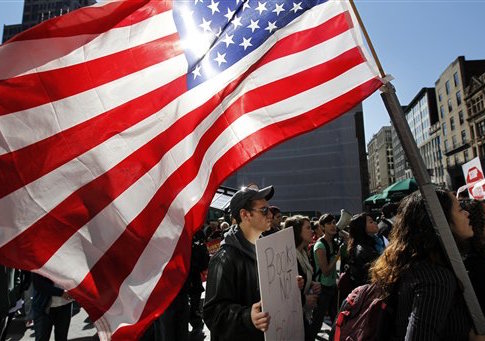"The approach of this book is episodic rather than exhaustive," writes Stephen Prothero, author of Why Liberals Win the Culture Wars (Even When They Lose Elections). This is a generous description. For readers interested in analysis more than the pursuit of an agenda, it is also a warning.
Prothero, a professor of religion at Boston University, undertook this investigation after puzzling over the conservative resistance to the construction of an Islamic cultural center near Ground Zero following the 9/11 attacks. American respect for religious liberty and private property weighed in favor of letting the project proceed, he writes, so "why all the fuss?" Rather than pondering the scar left nearby in the Manhattan earth, Mr. Prothero takes the long way around, writing a book misrepresenting conservatives throughout American history and never examining "all that fuss" too closely. The "post-9/11 Islam wars," he finds, are simply a new iteration of an old war between cultural conservatives and liberals.
Splicing together piecemeal American history, Mr. Prothero crafts a narrative in which the "conservative" camp—nearly always composed of white, angry, Protestant men—scrambles unsuccessfully to maintain fading cultural dominance in an increasingly diverse America. Propelled by a sense of loss, the conservatives act to "culturally exclude" those responsible, including political rivals, religious adversaries, and immigrant populations. Meanwhile, the liberal camp—tolerant and progressive—is provoked. A culture war ensues, but conservatives are fighting a lost battle. The war ends with the emergence of a new cultural norm, soon absorbed into the American ethos and forgotten as a liberal victory. The cycle renews.
To illustrate his theory, Mr. Prothero cherry-picks five episodes in American history, infusing each with the anachronistic perspectives of 21st-century liberalism: the heated electoral contests between Thomas Jefferson and John Adams; anti-Catholic agitation in the early 19th century; anti-Mormonism in the 20th century; Prohibition; and the contemporary culture wars on sex, art, and education, dating back to the 1970s.
There are surely some points in American history where something like Mr. Prothero's analysis applies, and with a more evenhanded approach Why Liberals Win may have proved an interesting addition to the culture wars genre. In a year when marriage was redefined by fiat, Planned Parenthood fetal organ trafficking drew only limited outcry, and race- and gender-obsessed cry-bullies took the American campus by storm, more than a few conservatives have wondered where it all went wrong.
But Prothero rigs the game from the outset, defining conservatives as exclusionary and liberals as welcoming and inclusive. He applies these labels to historical figures on the basis of whether their behavior conforms to modern liberal attitudes at any given point in time. In a particularly glaring example of scholastic capriciousness, Mr. Prothero concludes that Harriet Beecher Stowe was a cultural liberal for her writings on slavery but a cultural conservative when her anti-polygamy writings placed her on the wrong side of the Mormonism question.
This nonsense approach only caricatures both liberals and conservatives. Most of the people who formed the anti-slavery Republican Party were ex-Whigs who would have been mightily perplexed by our modern political categories. And it was self-identified progressives, not conservatives, who supported the practice of eugenics and forced sterilization in the early 20th century. But the "episodic" approach sidesteps the need for rigor and nuance by avoiding these and other such chapters in American history as the Civil War, World Wars I and II, and the New Deal.
Prothero’s five "episodes" omit critical social, economic, and cultural context. He also provides scant assessment of the aftermath of each liberal "victory," even in his discussion of contemporary culture wars. Why Liberals Win leaves the impression that the core cultural legacies of the Obama years are gay marriage and Tea Party racism; that American family breakdown is a non-issue; that the sorry state of schools and colleges is a still a victory on the road to an increasingly inclusive America because "liberals now control the agenda" in education as well as in law, family, pop culture, and the media.
Stripped of philosophical or cultural depth, history is re-engineered into a spotty portrayal of religion-centered power squabbles on the relentless march to progress. The true differences between conservatives and liberals—their fundamental divergences on human nature, liberty, moral order, tradition and authority, approaches to change—are hardly acknowledged as important, let alone discussed. And despite lip service to tolerance and pluralism, alternative ways of thinking are disdainfully mischaracterized and dismissed.
If Why Liberals Win is representative of the agenda whose ascendance it trumpets, its lazy approach suggests another answer as to why modern liberals have prevailed in many of the more recent culture wars. After all, if leeriness towards radical Islam is simply the new anti-Catholicism, anti-Mormonism, or social Puritanism, it is already a relic of a xenophobic past and need not be evaluated on the merits. Coupled with control of culture-forming institutions, this not-so-liberal attitude strangles the possibilities for dissent, conversation, and compromise, producing generations of people who have little choice but to see any opposition as groundless and misdirected.
As Prothero so tellingly put it in his opener: "Why all the fuss?"
